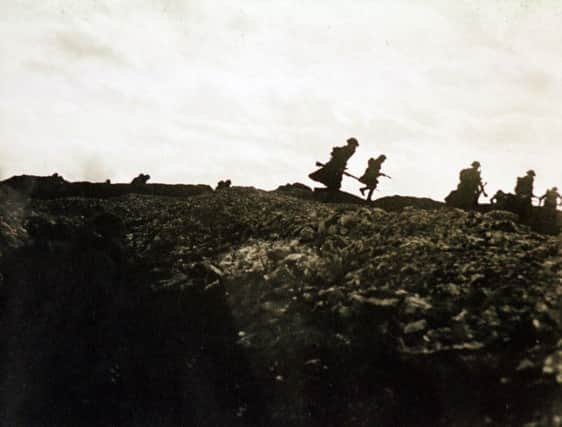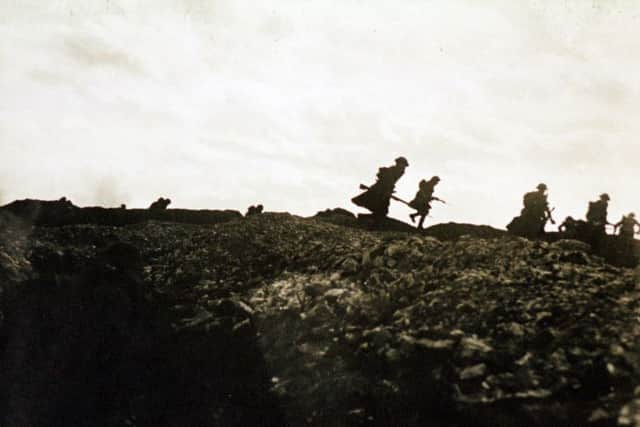Comment: The legacy of WW1 on Syria and Iraq
This article contains affiliate links. We may earn a small commission on items purchased through this article, but that does not affect our editorial judgement.


All the main players continue to underline the importance of Iraq’s and Syria’s territorial integrity (Kurdish aspirations for statehood notwithstanding). Conversely, the I.S. goal of establishing an Islamic state, stretching across existing boundaries, meets with sustained resistance. Even as States in the Middle East are ravaged by civil unrest, our leaders affirm the inviolability of their borders. But where do these borders come from? And how were they fixed? The answer is that – as in so many other areas of international relations - the contemporary Middle East was shaped in the aftermath of World War I.
Advertisement
Hide AdAdvertisement
Hide AdFrom January to June 1919 the leaders of the Allied and Associated Powers gathered in Paris to constitute the largest ever post-war conference and the first truly global assembly of sovereign states. Acting in many ways like a temporary world government, the peacemakers in Paris re-drew boundaries, modernised world affairs and in many ways established our contemporary system of international governance.


Drawing borders
In this re-ordering of world affairs, the settlement of the Middle Eastern boundaries was (in the words of Jack Straw), “an interesting history, but not an entirely honourable one”. That is probably an understatement.
Having defeated the Ottoman Empire, in Paris the British and French divided up most of the Middle East into spheres of influence. In doing so, they paid little regard to the ‘wishes of the populations concerned’,
something American President Wilson had emphasised must be a guiding principle for the peacemakers.
In the end, Britain and France took over former Ottoman territories as ‘mandates’ of the League of Nations - not colonies in name, but still administered from London and Paris. As “mandatory” powers, they defined the borders of the mandate territories. This effectively meant often drawing lines in the sand with little or no attention paid to the religious or tribal affinities of the populations that were affected.
States like Jordan, Syria, and Iraq emerged on the territory of these former mandates, and their current boundaries follow those between the French and British mandate territories. A curious legacy to defend.
Peace conference
And yet, if the territorial settlement in the Middle East was anything but “honourable”, it is by no means the only legacy of the Paris Peace Conference. Many other of its legacies are in fact rather more honourable.
The Peace Conference today is often criticised for having failed in its main task: it did not bring lasting peace to the world. It is true that barely two decades later an altogether more devastating war would erupt. But honourable legacies exist, and as we remember the centenary of a Great War, we should acknowledge them. Two such legacies are
worth special mention.
Advertisement
Hide AdAdvertisement
Hide AdFirst, the Paris Peace Conference marked the beginning of the modern era of international organisations. It set up the League of Nations, the predecessor of today’s United Nations. And since the 1920s, within these ‘world organisations’, a whole array of international agencies has emerged to change the face of international relations. Of course, the League of Nations and UN are often criticised as ineffective or toothless, and often with good reason. But international organisations have become our main port of call whenever global problems call for global action. Reducing carbon emissions may be an uphill struggle - but
where would we be without the United Nations? Whether the world can contain the outbreak of Ebola is an open question at the moment - but there is no doubt that it could not do so without the World Health Organisation, a UN agency. Today, in humanitarian crises or in military conflicts, we expect international organisations to take the lead. And in the move towards international organisations, the Paris Peace Conference was a watershed.
Air strikes
A second legacy takes us back to the Middle East, and to last week’s Commons vote. Defending the government’s decision, David Cameron referred to the “barbaric acts of ISIL against the peoples of Iraq including the Sunni, Shia, Kurds, Christians and Yazidi and the humanitarian crisis this is causing”. Today, we may debate whether military strikes are a
meaningful way to defend human rights of others. But it seems beyond doubt that they are at least a matter of concern for us. In this respect, too, the legacy of the Paris Peace Conference is important.
The peacemakers did not establish our modern system of human rights. That would only emerge after World War II. But the debates of 1919, and the League of Nations’ work during the 1920s, marked at least the ‘prologue’ to modern human rights protection. An Anti-Slavery Convention was signed under the auspices of the League that was a forerunner of contemporary efforts to combat human trafficking.
The peacemakers at Paris established a system of minority protection that granted ethnic and religious minorities rights in relation to their governments. That system was no more than a first step. But it marked a beginning: governments could no longer plead that the fate of minorities would be a purely internal matter.
Almost a century on, the fight for human rights is by no means won.
Human rights
Today we hear arguments about state sovereignty and “internal affairs” from a Chinese government worried about demonstrations in Hongkong – and a major political party considers downgrading the role of the Strasbourg court, the most effective system of regional human rights protection. But the move towards international rights of individuals and minorities is well under way. And again, just as with international organisations, the Paris Peace Conference marked an important first step.
Advertisement
Hide AdAdvertisement
Hide AdAll this suggests that as we look back and remember the Great War and its impact, we should not only look to 1914, but also to 1919. The Paris Peace Conference marked a new way of ending wars. It yields honourable and less honourable lessons. And for better or worse, it has shaped our contemporary system of world affairs.
• Christian J. Tams is Professor of International Law at the University. From next Monday (13 October), he runs a free online course entitled ‘Paris 1919 – A New World Order’. Information on the course and a short video trailer are at https://www.futurelearn.com/courses/ww1-new-world-order.
• Peter Jackson is Professor of Global Security at the University of Glasgow. His book ‘Beyond the Balance of Power: France and the politics of national security in the era of the First World War’ was published by Cambridge University Press earlier this year.